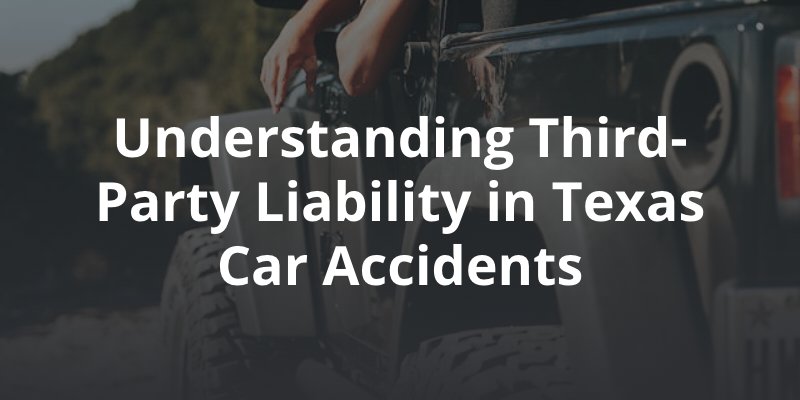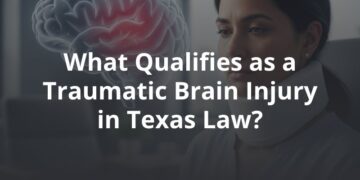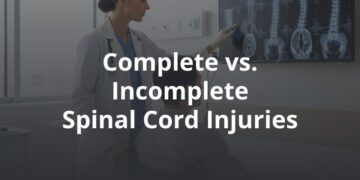
Car accidents are some of the most physically, emotionally and financially devastating incidents in Texas. A car crash can inflict severe injuries and take lives. It’s important to fully understand your rights as a car accident victim so that you can maximize your recovery.
Third-party liability – holding someone other than just the other driver responsible – is something you need to consider after a Texas car accident. Understanding this legal concept can help you make informed decisions that lead to the best possible case result.
What Is a Third Party?
A “third party” in a car accident claim refers to an individual or entity that was not directly involved in the crash or present at the scene, but that contributed to the collision or the injuries suffered by victims in some way.
The first party is the person filing the insurance claim and the second party is the other primary party involved. If you are filing a claim for a car accident, for example, you would be the first party and the second party would be the at-fault driver.
A third party describes anyone else involved in the case that is not one of the two primary parties. Any other party that may share liability (legal and financial responsibility) for the accident can be listed as a third party on the claim.
Why Does Third-Party Liability Matter?
Motor vehicle accidents have the potential to cause thousands of dollars in damages for victims. Medical bills, lost wages and property repairs can be difficult to cover, especially after a serious collision.
Texas’s minimum required amounts of insurance may not be enough to pay for a car accident with significant damages. A third-party liability claim can offer additional or supplemental coverage on top of the required 30/60/25 coverage.
Third-party liability insurance can offer financial protection to make sure you are adequately compensated for the losses you sustained as a victim. It provides you with multiple insurance policies to exhaust rather than just one.
Common Third Parties Involved in Texas Car Accident Claims
Automobile accidents in Texas often involve more than just two drivers. While it may not be immediately apparent, several factors may have contributed to a motor vehicle collision, from roadway hazards to vehicle defects. This is why a thorough crash investigation is necessary to identify all at-fault parties.
An Employer
If a motor vehicle driver was on duty for his or her job at the time of the collision, the driver’s employer can likely be held vicariously liable as a third party. Employers in Texas are held responsible for the actions and mistakes of their on-duty employees.
Someone who was actively driving for a trucking company, delivery service, rideshare company, taxi company, the government, a utility company or any other employer in Texas at the time of the accident could expose the employer to third-party liability.
Vehicle Owner
The owner of the motor vehicle, if different from the driver, may share liability for an accident if it was caused by an equipment failure or maintenance issue. Vehicle owners in Texas have a legal responsibility to ensure the safety and roadworthiness of their cars and trucks.
Vehicle owners may be held liable for the following issues in relation to an auto accident:
- Brake failure
- Tire blowout
- Steering system failure
- Electrical mishap
- Engine failure
- Lights that don’t work
- Faulty seat belts
- Disconnected airbags
If an investigation finds that a part breakdown caused by inadequate maintenance or low-quality repairs contributed to the car crash, the owner of the vehicle can be held accountable. The party in charge of vehicle maintenance may be an individual or company.
Product Manufacturer
Vehicle part defects can contribute to motor vehicle collisions in Texas. Defective car parts refer to parts with manufacturing, design or marketing flaws that make them inherently dangerous. An example is a tire that is made with faulty material, resulting in uneven tread wear and the tire unexpectedly exploding on a drive.
Other common defective vehicle parts include brakes, wiring, seat belts, airbags, seatbacks, fuel systems and engines. Automakers, part manufacturers and distributors could all be held responsible via product liability claims for defective car parts that contribute to accidents or injuries.
A Property Owner (or the Government)
It may be possible to hold a property owner responsible for a car crash in Texas if a dangerous premises contributed to the crash. This includes the government if the collision occurred on a public roadway.
Road defects such as potholes, cracks, missing guardrails or reflectors, faulty stoplights, obscured traffic signs, and debris can point to government or property owner liability for a related car accident.
A Dram Shop
In Texas, dram shop laws make it possible to hold alcohol vendors liable for drunk driving collisions in certain circumstances. You may be eligible for compensation from a bar, restaurant, liquor store or social host if that party knowingly served someone underage or a person who was already visibly intoxicated.
Types of Third-Party Insurance Coverage for Auto Accidents
Third-party coverage for an auto accident case in Texas can involve many different types of insurance, depending on the identity of the at-fault party and the terms of the policy.
Common examples include:
- Bodily injury liability
- Property damage liability
- Medical payment (MedPay)
- Personal injury protection (PIP)
- Uninsured/underinsured motorist (UM/UIM)
- Collision
- Comprehensive
- Commercial auto insurance
A third-party liability claim could result in financial compensation for losses such as medical bills, lost wages and earnings, lost future capacity to earn, property damage repairs, travel costs, and pain and suffering.
How to File and Prove a Third-Party Claim in Texas
If you think you have grounds to hold a third party responsible for your recent car crash in Texas, start the claims process by contacting a car accident attorney in Austin. A lawyer can investigate your accident to search for signs of negligence, or the failure to act with proper care.
A lawyer can identify all liable parties in your case and file the paperwork to initiate one or more claims. Then, your lawyer can gather evidence to support your case. The goal is to show that a third party owed you a duty of care, breached this duty, and caused your accident or injuries.
How a Car Accident Attorney in Texas Can Help
Hiring an experienced Austin personal injury law firm to represent you during a Texas car accident case can enable you to optimize your recovery. A lawyer can help you identify all of your outlets for collecting compensation, including third parties. For a no-cost, no-pressure review of your individual car accident case in Texas, contact FVF Law Firm.







